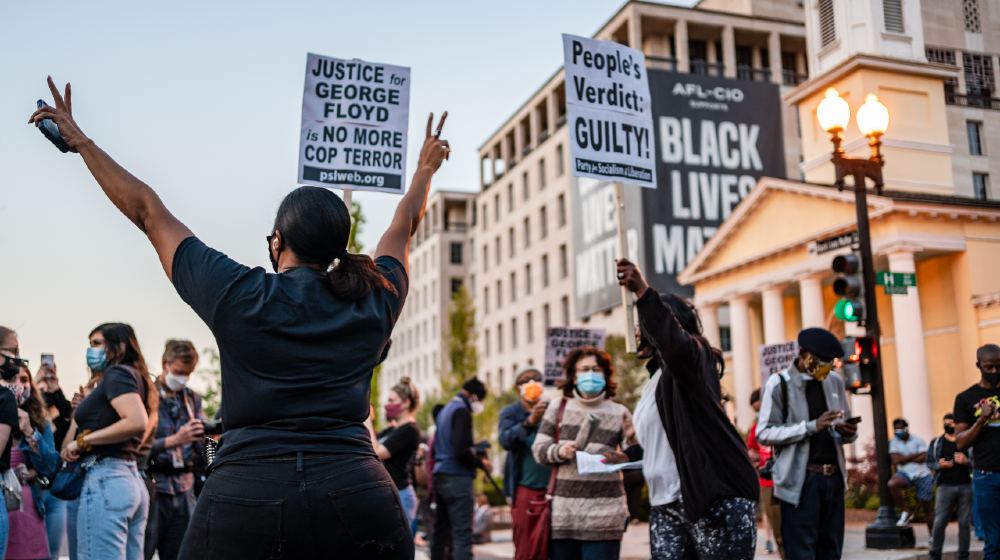US News
Minneapolis Holds Rallies in Build-Up to Anniversary of George Floyd’s Death

Hundreds of people gathered on Sunday for the rally in front of the courthouse in downtown Minneapolis where a month ago former policeman Derek Chauvin was found guilty of murdering the black man by kneeling on his neck.
Minneapolis Holds Rallies in Build-Up to Anniversary of George Floyd's Death
Many marchers carried signs with pictures of Floyd, Philando Castile, and other black men killed by police.
Amid chants of “no justice, no peace!” and “Say his name,” Minnesota governor Tim Walz, Minneapolis mayor Jacob Frey and St Paul mayor Melvin Carter watched alongside a dozen of Floyd’s family members as speakers called for justice for families of black men slain by police.
“It has been a long year. It has been a painful year,” Floyd’s sister Bridgett told the crowd on Sunday. “It has been very frustrating for me and my family for our lives to change in the blink of an eye — I still don’t know why,” The Guardian reported.
Tuesday will mark one year since Floyd’s death sparked worldwide protests and calls for change in policing in the US.
Speakers at the event included several local activists, Floyd family attorney Ben Crump, the Rev Al Sharpton, who called on the US Senate to pass legislation on policing in Floyd’s name.
The legislation, which would bring about the most significant changes to policing on the federal level, would ban the use of chokeholds and establish a national database of police misconduct.
“We want something coming out of Washington. We want something that will change federal law,” Sharpton said. “There’s been an adjournment on justice for too long. It’s time for them to vote and make this the law.”
The program of events marking the first anniversary has been organized by the George Floyd Memorial Foundation, a non-profit organization founded by Bridgett Floyd.
The events will also include a number of roundtable discussions featuring activists and family members of other Americans killed by police, including Gwen Carr, the mother of Eric Garner, who was killed by New York City police in 2015, and Katy and Aubrey Wright, the parents of Daunte Wright, who was killed by police in a Minneapolis suburb last month.
Floyd was placed in a fatal knee-to-neck restraint by Chauvin in May last year. The incident was captured on video by a number of bystanders and sent shockwaves around the world.
Last month Chauvin was convicted of second-degree murder and two other felonies and faces up to 40 years in prison. Three other officers involved in the arrest are awaiting trial.
On Tuesday, the first anniversary of Floyd’s death, Joe Biden will meet the Floyd family at the White House as negotiations continue in Congress over police reform legislation. The foundation will also host a “celebration of life” event at a downtown park in Minneapolis.
“We will celebrate the life and legacy of George Floyd through Black culture, art, history, and support of local businesses,” organizers said, adding there will be performances from a number of local and “Grammy award-winning artists”.
On Friday the foundation awarded a $25,000 scholarship to Fayetteville State University, a historically Black college in North Carolina.
Bridgett Floyd presented the check to the university and said: “That’s what it’s all about – generational stamps. We need to put things in place for our kids’ kids. That’s what I’m here to do.”
During an address to Congress last month, the president had said he wanted major police reform legislation on his desk by Tuesday, but negotiations are still far from a resolution.
One of several sticking points on the bill, which already passed the Democrat-held House, is the issue of ending qualified immunity, which protects police officers from being personally sued by victims and their families for alleged civil rights violations.
While ending or restricting qualified immunity is largely seen as a must-have for police reform advocates, it is staunchly opposed by police unions.
“My concern is, and I’ve communicated this to the White House, is that we come with a toothless bill to meet a hard deadline,” Sharpton, president of the National Action Network, told Politico. “I’d rather have a bill with teeth late than a toothless bill on time.”
Since Floyd’s killing, at least 17 states, including Minnesota, have enacted legislation to ban or restrict the use of chokeholds and neck restraints by police officers, according to data provided to the Associated Press by the National Conference of State Legislatures.
Before then, only two states, Tennessee and Illinois, had bans on such police hold techniques. A majority of the bans enacted over the past year are in states controlled politically by Democrats.
You Might Also Like:
- Wuhan Lab Staff Sought Treatment In November 2019
- Trump Preparing To Hit The Campaign Trail
- Why Do Perceptions and Priorities Differ Among Americans?
Keep up to date with the breaking news by following us on Facebook and Instagram.
Article Source: NewsEdge













1 Comment
Lets face the truth if george floyd had not been resisting arrest he would still be alive today , that is no excuse for what happened , but resisting arrest is stupid if you don’t want to get hurt . and the BLM is just a bunch of terroist